-
 Bitcoin
Bitcoin $82,099.5826
-1.34% -
 Ethereum
Ethereum $1,817.9545
-1.07% -
 Tether USDt
Tether USDt $0.9999
0.02% -
 XRP
XRP $2.0815
-3.96% -
 BNB
BNB $595.8647
-1.53% -
 Solana
Solana $124.0327
-0.92% -
 USDC
USDC $1.0000
0.01% -
 Dogecoin
Dogecoin $0.1634
-3.94% -
 Cardano
Cardano $0.6445
-4.65% -
 TRON
TRON $0.2336
1.34% -
 Toncoin
Toncoin $3.9381
2.61% -
 Chainlink
Chainlink $13.2201
-3.75% -
 UNUS SED LEO
UNUS SED LEO $9.0947
-5.84% -
 Stellar
Stellar $0.2646
-1.90% -
 Avalanche
Avalanche $18.6234
-3.91% -
 Shiba Inu
Shiba Inu $0.0...01214
-3.88% -
 Sui
Sui $2.2126
-6.78% -
 Hedera
Hedera $0.1604
-6.61% -
 Polkadot
Polkadot $4.0237
-1.97% -
 Litecoin
Litecoin $82.1655
-4.48% -
 MANTRA
MANTRA $6.2849
-1.13% -
 Bitcoin Cash
Bitcoin Cash $298.8203
-2.66% -
 Dai
Dai $1.0000
0.02% -
 Bitget Token
Bitget Token $4.4293
-4.57% -
 Ethena USDe
Ethena USDe $1.0000
0.01% -
 Pi
Pi $0.6976
-9.77% -
 Hyperliquid
Hyperliquid $12.5853
-0.74% -
 Monero
Monero $215.4717
-0.22% -
 Uniswap
Uniswap $5.8825
-1.85% -
 Aptos
Aptos $5.1958
-2.29%
How to exchange tokens in Trust Wallet?
Trust Wallet integrates with DEXs like PancakeSwap and Uniswap for token swaps, requiring users to navigate external platforms and manage gas fees and slippage.
Mar 27, 2025 at 08:56 am
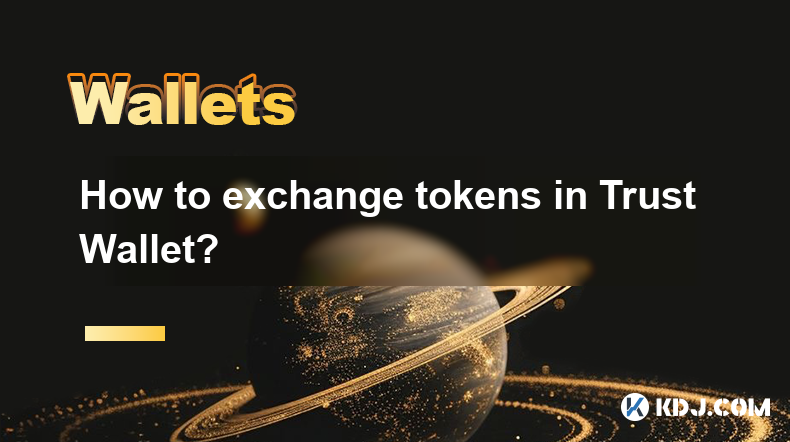
Understanding Trust Wallet's Exchange Functionality
Trust Wallet, a popular mobile cryptocurrency wallet, doesn't have a built-in exchange in the traditional sense. Instead, it integrates with decentralized exchanges (DEXs) and other platforms to facilitate token swaps. This means you don't directly exchange within the Trust Wallet app itself; you use the app to connect to external services for the actual exchange process. This approach offers access to a wide range of tokens and trading pairs, but requires understanding how to interact with these external platforms.
Connecting to a Decentralized Exchange (DEX)
To exchange tokens within Trust Wallet, you'll need to connect to a DEX. Popular choices integrated with Trust Wallet include PancakeSwap (for Binance Smart Chain tokens), Uniswap (for Ethereum tokens), and others depending on the network your tokens reside on. The process is generally similar across different DEXs. Remember to always double-check the contract address of the token you're trading to avoid scams.
- Open your Trust Wallet app and select the token you wish to exchange.
- Look for an option to "Swap" or "Exchange" – the exact wording may vary depending on the DEX you've connected to.
- Select the DEX you want to use from the list provided. Ensure it's compatible with your chosen token's blockchain.
- You'll be redirected to the DEX's interface within the Trust Wallet app. Follow the on-screen instructions to complete the swap.
Navigating the DEX Interface within Trust Wallet
Once connected to a DEX, the interface will appear within Trust Wallet. This interface is managed by the DEX, not Trust Wallet directly. Therefore, the specific steps might differ slightly depending on the DEX you're using. However, the core elements are usually similar:
- Select the token you're selling: This will be the token you already hold in your Trust Wallet.
- Enter the amount: Specify how much of the token you want to exchange.
- Select the token you're buying: Choose the token you want to receive in exchange.
- Review the exchange rate and fees: Pay close attention to the fees charged by the DEX, as these can vary significantly.
- Confirm the transaction: After carefully reviewing all details, confirm the transaction to proceed with the swap.
Understanding Gas Fees and Slippage
When exchanging tokens on a DEX, you'll encounter gas fees. These are transaction fees paid to the blockchain network to process your swap. The amount of gas varies depending on network congestion and the complexity of the transaction. High network congestion leads to higher gas fees. Always check the estimated gas fees before confirming your transaction.
Slippage refers to the difference between the expected exchange rate and the actual rate at which your trade executes. Slippage can occur due to market volatility. DEXs usually allow you to set a maximum acceptable slippage to avoid unexpectedly unfavorable trades. Consider setting a reasonable slippage tolerance to ensure your trade goes through.
Security Best Practices When Exchanging Tokens
Security is paramount when dealing with cryptocurrencies. Always practice caution and follow these best practices:
- Only use reputable and well-known DEXs. Research thoroughly before using any unfamiliar platform.
- Double-check the contract address of the tokens you're trading. Incorrect addresses can lead to significant losses.
- Enable two-factor authentication (2FA) on your Trust Wallet and any connected DEXs. This adds an extra layer of security to your account.
- Be wary of phishing scams. Never click on suspicious links or share your seed phrase with anyone.
Exchanging Tokens on Different Blockchains
The process of exchanging tokens varies slightly depending on the blockchain your tokens are on. For instance, exchanging BEP-20 tokens (Binance Smart Chain) will typically involve PancakeSwap, while exchanging ERC-20 tokens (Ethereum) might use Uniswap. Ensure you select the appropriate DEX compatible with your token's blockchain. Attempting to exchange tokens on the wrong network will result in failure.
Troubleshooting Common Issues
Sometimes, issues can arise during the exchange process. These may include insufficient funds, high gas fees, or network congestion. Carefully review error messages provided by the DEX and Trust Wallet. If you encounter persistent problems, consult the support documentation for the specific DEX you're using. The Trust Wallet support team may also be able to offer assistance.
Frequently Asked Questions
Q: Can I exchange any token in Trust Wallet?
A: No, Trust Wallet itself doesn't perform the exchange. It acts as an interface to connect to DEXs. The availability of tokens depends on the DEX's supported networks and token listings.
Q: What are gas fees, and why are they important?
A: Gas fees are transaction fees paid to the blockchain network for processing your exchange. They vary based on network congestion. High gas fees can significantly impact the cost of your exchange. Always check the gas fee estimate before confirming.
Q: What is slippage, and how can I mitigate it?
A: Slippage is the difference between the expected and actual exchange rate. It’s caused by market volatility. You can mitigate it by setting a maximum acceptable slippage percentage on the DEX.
Q: Is it safe to exchange tokens in Trust Wallet?
A: The safety depends on the DEX you use and your own security practices. Use reputable DEXs, enable 2FA, and be cautious of phishing attempts. Always verify contract addresses.
Q: What if I encounter an error during the exchange?
A: Check the error messages from the DEX and Trust Wallet. If the problem persists, consult the DEX's support documentation or contact Trust Wallet support.
Q: How do I choose the right DEX for my token?
A: Choose a DEX that supports the blockchain your token is on (e.g., PancakeSwap for Binance Smart Chain, Uniswap for Ethereum). Research and select a reputable and well-established DEX.
Disclaimer:info@kdj.com
The information provided is not trading advice. kdj.com does not assume any responsibility for any investments made based on the information provided in this article. Cryptocurrencies are highly volatile and it is highly recommended that you invest with caution after thorough research!
If you believe that the content used on this website infringes your copyright, please contact us immediately (info@kdj.com) and we will delete it promptly.
- The Crypto World Has Many Choices for Investors Who Want Safe Gains
- 2025-03-31 21:20:13
- Dogecoin (DOGE) Has a Turbulent Start to March, But Technical Indicators Hint at a Potential Bullish Turnaround
- 2025-03-31 21:20:13
- Dogecoin (DOGE) and Shiba Inu (SHIB) Whales Are Dumping to Buy Coldware (COLD)
- 2025-03-31 21:15:12
- Australia's financial crime regulator warns cryptocurrency ATM providers that many of these machines may be facilitating money laundering or defrauding victims
- 2025-03-31 21:15:12
- As Sui (SUI) Prepares to Unlock $151M, Coldware (COLD) Quietly Captures the Next Billion Users
- 2025-03-31 21:10:12
- Cryptocurrency investors are increasingly moving capital into stablecoins and tokenized real-world assets (RWAs)
- 2025-03-31 21:10:12
Related knowledge

How to easily generate a Bitcoin payment address
Mar 29,2025 at 10:49am
Generating a Bitcoin payment address might seem daunting, but it's actually quite straightforward. This process is crucial for receiving Bitcoin, as each transaction requires a unique address. Understanding how this works is fundamental to using Bitcoin effectively. This guide will walk you through the simple steps, regardless of your technical experti...
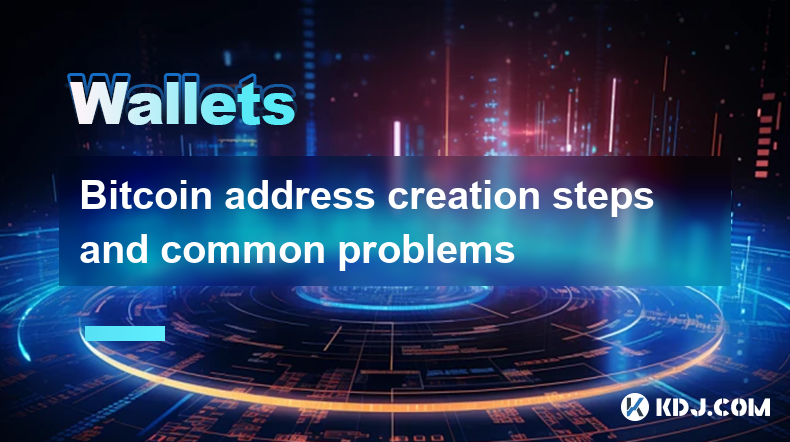
Bitcoin address creation steps and common problems
Mar 30,2025 at 06:07am
Understanding Bitcoin AddressesA Bitcoin address is a unique identifier, similar to a bank account number, used to receive Bitcoin. It's a string of alphanumeric characters generated from a public key, derived from your private key. Understanding the distinction between public and private keys is crucial for Bitcoin security. Your private key should be...
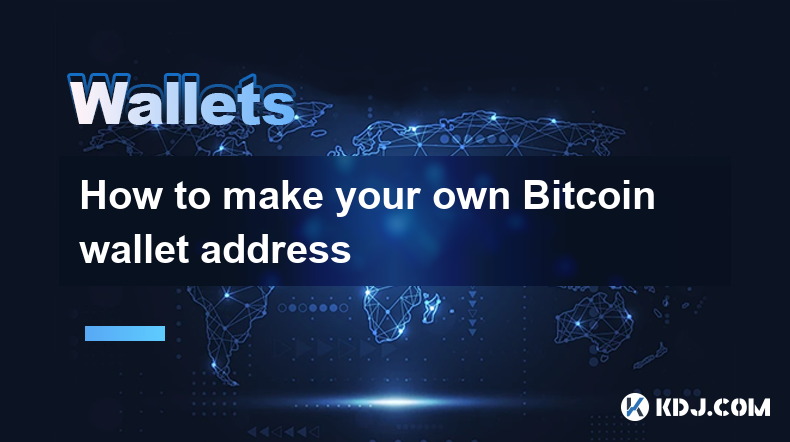
How to make your own Bitcoin wallet address
Mar 29,2025 at 08:42pm
Creating your own Bitcoin wallet address is crucial for securing and managing your Bitcoin holdings. It allows you to independently receive and send Bitcoin without relying on third-party services. This process involves understanding the different types of wallets and choosing the one that best suits your needs and technical expertise. Incorrectly gene...
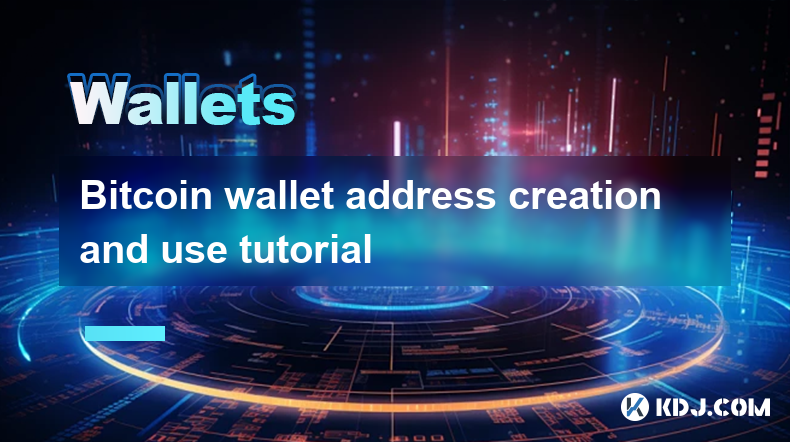
Bitcoin wallet address creation and use tutorial
Mar 29,2025 at 10:14pm
Understanding Bitcoin Wallet AddressesA Bitcoin wallet doesn't store Bitcoin in the way a traditional bank account does. Instead, it stores private keys, which are cryptographic secrets allowing you to access and spend your Bitcoin. Your Bitcoin address, on the other hand, is a public identifier, like an email address, that others can use to send you B...

Bitcoin address generation and secure storage guide
Mar 30,2025 at 08:07am
Understanding Bitcoin AddressesA Bitcoin address is essentially your public key, a string of alphanumeric characters used to receive Bitcoin. It's analogous to your bank account number. Unlike your private key, which is crucial for spending your Bitcoin, your address can be shared publicly without compromising your funds. Generating a new address is sim...
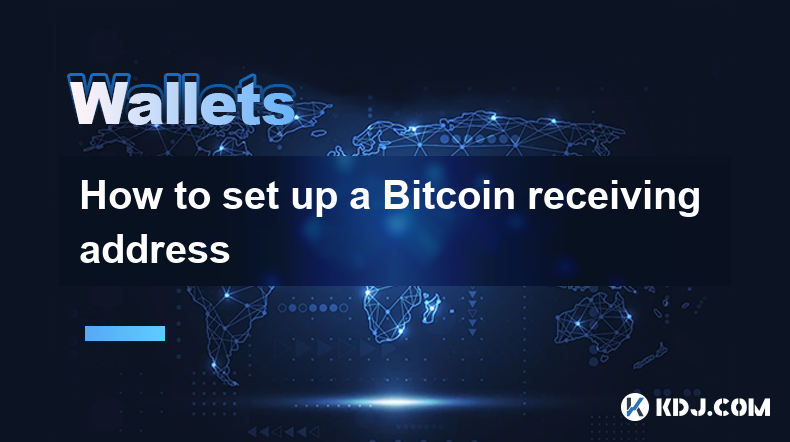
How to set up a Bitcoin receiving address
Mar 30,2025 at 06:14pm
Understanding Bitcoin Receiving AddressesA Bitcoin receiving address is essentially your unique identifier on the Bitcoin network. It's a string of alphanumeric characters that allows others to send Bitcoin to you. Think of it like your bank account number, but specifically for Bitcoin. You need a receiving address to receive Bitcoin. Crucially, you ca...

How to easily generate a Bitcoin payment address
Mar 29,2025 at 10:49am
Generating a Bitcoin payment address might seem daunting, but it's actually quite straightforward. This process is crucial for receiving Bitcoin, as each transaction requires a unique address. Understanding how this works is fundamental to using Bitcoin effectively. This guide will walk you through the simple steps, regardless of your technical experti...

Bitcoin address creation steps and common problems
Mar 30,2025 at 06:07am
Understanding Bitcoin AddressesA Bitcoin address is a unique identifier, similar to a bank account number, used to receive Bitcoin. It's a string of alphanumeric characters generated from a public key, derived from your private key. Understanding the distinction between public and private keys is crucial for Bitcoin security. Your private key should be...

How to make your own Bitcoin wallet address
Mar 29,2025 at 08:42pm
Creating your own Bitcoin wallet address is crucial for securing and managing your Bitcoin holdings. It allows you to independently receive and send Bitcoin without relying on third-party services. This process involves understanding the different types of wallets and choosing the one that best suits your needs and technical expertise. Incorrectly gene...

Bitcoin wallet address creation and use tutorial
Mar 29,2025 at 10:14pm
Understanding Bitcoin Wallet AddressesA Bitcoin wallet doesn't store Bitcoin in the way a traditional bank account does. Instead, it stores private keys, which are cryptographic secrets allowing you to access and spend your Bitcoin. Your Bitcoin address, on the other hand, is a public identifier, like an email address, that others can use to send you B...

Bitcoin address generation and secure storage guide
Mar 30,2025 at 08:07am
Understanding Bitcoin AddressesA Bitcoin address is essentially your public key, a string of alphanumeric characters used to receive Bitcoin. It's analogous to your bank account number. Unlike your private key, which is crucial for spending your Bitcoin, your address can be shared publicly without compromising your funds. Generating a new address is sim...

How to set up a Bitcoin receiving address
Mar 30,2025 at 06:14pm
Understanding Bitcoin Receiving AddressesA Bitcoin receiving address is essentially your unique identifier on the Bitcoin network. It's a string of alphanumeric characters that allows others to send Bitcoin to you. Think of it like your bank account number, but specifically for Bitcoin. You need a receiving address to receive Bitcoin. Crucially, you ca...
See all articles






















































































